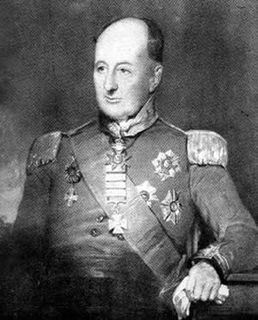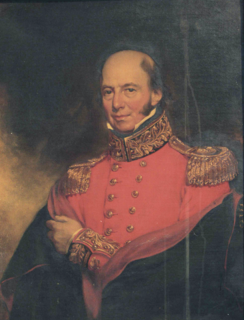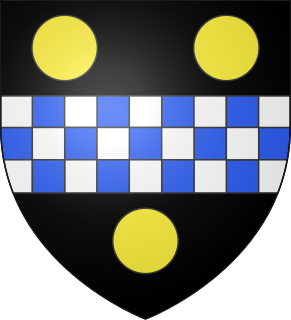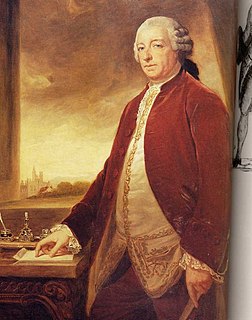 W
WField Marshal John Campbell, 2nd Duke of Argyll, 1st Duke of Greenwich,, styled Lord Lorne from 1680 to 1703, was a Scottish nobleman and senior commander in the British Army. He served on the continent in the Nine Years' War and fought at the Battle of Kaiserwerth during the War of the Spanish Succession. He went on to serve as a brigade commander during the later battles of the War of the Spanish Succession. Next he was given command of all British forces in Spain at the instigation of the Harley Ministry; after conducting a successful evacuation of the troops from Spain, he became Commander-in-Chief, Scotland. During the Jacobite Rebellion, he led the government army against the Jacobites led by the Earl of Mar at the Battle of Sheriffmuir. He went on to serve as Lord Steward and then Master-General of the Ordnance under the Walpole–Townshend Ministry.
 W
WLieutenant-General Robert Balfour of Balbirnie was a son of John Balfour of Balbirnie and Mary Gordon, daughter of James Gordon of Ellon. He was an officer in the 2nd Dragoons and the Fife Light Horse. His younger brother James was a Member of Parliament and grandfather of Arthur Balfour, Prime Minister of the United Kingdom from 1903 to 1905.
 W
WRobert Blair VC was a Scottish recipient of the Victoria Cross, the highest and most prestigious award for gallantry in the face of the enemy that can be awarded to British and Commonwealth forces.
 W
WLieutenant General Sir Benjamin D'Urban was a British general and colonial administrator, who is best known for his frontier policy when he was the Governor in the Cape Colony.
 W
WLieutenant General William Home, 8th Earl of Home was a Scottish peer and the British Governor of Gibraltar between 1757 and 1761. Lord Home was a well-known spendthrift.
 W
WMajor-General John Gaspard Le Marchant was one of the finest British cavalry commanders of his generation; he was also an intellectual soldier who had a great influence on the efficient functioning of the army he served in. He was instrumental in the process which produced the first British military academy and staff college; and he saw active service in the French Revolutionary Wars and the Peninsular War until his death at the Battle of Salamanca.
 W
WRichard Leveson was an English soldier and politician who served under James II and then William III after the 1688 Glorious Revolution. He was Member of Parliament for Lichfield 1685–1687 and for Newport, Isle of Wight from 1692–1695.
 W
WGeneral William Loftus was a British Army officer and Member of Parliament.
 W
WThomas Innes Pitt, 1st Earl of Londonderry was a British Army officer, speculator and Whig politician who sat in the House of Commons from 1713 to 1728. He served as Governor of the Leeward Islands from 1728 to his death in 1729.
 W
WJohn Montagu, 2nd Duke of Montagu,, styled Viscount Monthermer until 1705 and Marquess of Monthermer between 1705 and 1709, was a British peer.
 W
WGeneral George Augustus Herbert, 11th Earl of Pembroke and 8th Earl of Montgomery KG PC was an English peer, army officer, and politician.
 W
WGeorge Germain, 1st Viscount Sackville, PC, styled The Honourable George Sackville until 1720, Lord George Sackville from 1720 to 1770 and Lord George Germain from 1770 to 1782, was a British soldier and politician who was Secretary of State for America in Lord North's cabinet during the American War of Independence.
 W
WSir Henry Bouverie Paulet St John-Mildmay, 5th Baronet, of Dogmersfield Park, Hampshire, was an English landowner and British Army officer.
 W
WMajor General Sir Nevill Maskelyne Smyth, was a senior officer in the British Army and a recipient of the Victoria Cross, the highest award for gallantry in the face of the enemy that can be awarded to British and Commonwealth forces.
 W
WBrigadier-General Sir Percy Molesworth Sykes, was a soldier, diplomat, and scholar with a considerable literary output. He wrote historical, geographical, and biographical works, as well as describing his travels in Persia and Central Asia.
 W
WLieutenant-General Coote Synge-Hutchinson was a British Army officer.
 W
WSir John Talbot was an English politician, soldier, and landowner, who was Member of Parliament for various seats between 1660 and 1685. He held rank in a number of regiments, although he does not appear to have seen active service.
 W
WLieutenant-General Sir Herbert Taylor was the first Private Secretary to the Sovereign of the United Kingdom, serving Kings George III, George IV and William IV.
 W
WField Marshal George Townshend, 1st Marquess Townshend, PC, known as The Viscount Townshend from 1764 to 1787, was a British soldier and politician. After serving at the Battle of Dettingen during the War of the Austrian Succession and the Battle of Culloden during the Jacobite Rising, Townshend took command of the British forces for the closing stages of the Battle of the Plains of Abraham during the Seven Years' War. He went on to be Lord Lieutenant of Ireland or Viceroy where he introduced measures aimed at increasing the size of Irish regiments, reducing corruption in Ireland and improving the Irish economy. In cooperation with Prime Minister North in London he solidified governmental control over Ireland. He also served as Master-General of the Ordnance, first in the North Ministry and then in the Fox–North Coalition.
 W
WGeneral Sir Charles Pyndar Beauchamp Walker, was a senior officer in the British Army.